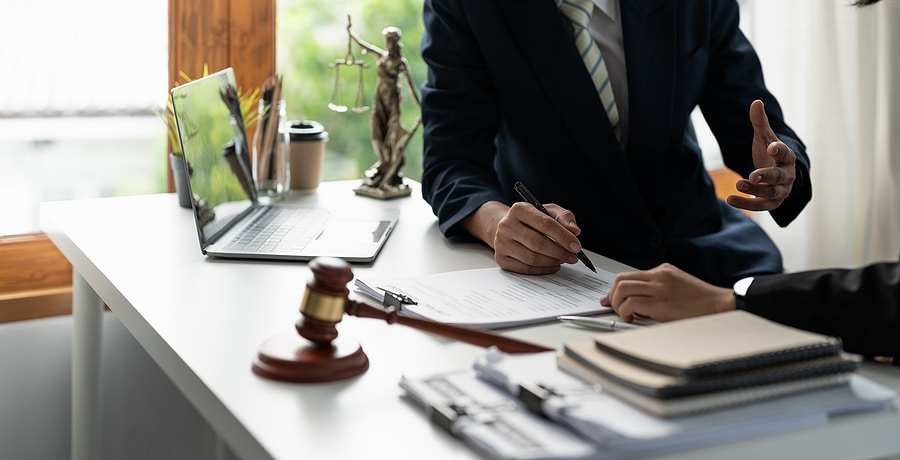There are numerous things that must be considered before trial that are far more than just “housekeeping” items. The actual trial is where your freedom is at stake, and the court system takes it extremely seriously. Criminal trials are coordinated and planned to an extent to allow both the state and you to effectively present their case. The pretrial conference is a critical milestone in your case because it both sets the ground rules for the trial and could even facilitate a resolution of your case.

The pretrial conference is a required procedure in a misdemeanor case. It is the rough equivalent of the scheduling conference in a felony case. Judges are increasingly using status conferences to handle and determine substantive legal issues.
The Parties Will Gather and Talk in Front of the Judge
A pretrial conference is where the parties formally get together under the auspices of the judge. The defendant (or their lawyer) can formally meet with the prosecutor to discuss the facts of the case. Although there may not be a resolution of the case at the pretrial conference, it is climactic in a sense. The pretrial conference is largely the culmination of any plea bargain negotiations. Although your decision to go to trial may have been made before the actual pretrial conference, it is when both sides inform the judge that the trial will actually happen.
Before the hearing, the prosecutor may have sent you a proposed resolution of the case that could even mean a reduction of the charges or a lighter sentence. You would consider the offer in consultation with your attorney before deciding whether to accept it. If you and your attorney do not believe that the prosecutor can prove the charges, you may reject the offer and decide to go to trial.
The Judge Could Facilitate Plea Bargain Negotiations
Your attorney may have had discussions with the prosecutor about a potential plea bargain. You may still be unable to agree on the exact terms of a deal with the prosecutor. The judge could use the pretrial conference to facilitate continued discussions and help the parties reach a deal. Alternatively, the attorneys may inform the judge that they did not reach a deal and that a criminal trial will be necessary. Knowing that a trial will happen, the judge may then lay out the next steps in the case and establish the rules for the coming trial. While the judge must follow rules of evidence, they have some discretion in how they run their courtroom.
There may also be some outstanding motions in the case that have been filed by either party for the judge’s consideration. The judge may use the pretrial conference as the time to issue a ruling on these motions. The judge may ask for oral arguments at the time before they issue the ruling. In this way, the pretrial conference could be crucial for your defense.
If the case is going to trial, the final pretrial conference could feature a discussion of the plan for the trial. The judge may lay out the rules for introducing evidence in the case.
The Judge May Consider the Specific Plea Bargain Reached
If you have reached a plea agreement with the prosecutor, it would need to be presented to the court. It is not automatic that the judge would approve the plea agreement. On occasion, the judge rejects the plea agreement, especially if they believe that it is overly generous for the defendant. The judge is also not bound by the terms of the plea agreement when they sentence, although they will usually give weight to the prosecutor’s recommendation.
The status conference can become a sentencing if a plea agreement has been reached. If the parties inform that judge that they have reached an agreement, the judge would then proceed to consider the actual plea bargain. They could do it immediately if they choose. In many cases, the judge will set a sentencing date in the future in order to give them time to consider the sentence.
You Have a Legal Right to a Pretrial Conference
A pretrial conference is your right as a defendant. According to Wisconsin law, you have the right to waive a pretrial conference through an agreement with the prosecutor. However, a pretrial conference can be a valuable tool, both to learn what the prosecutor is thinking and to obtain more favorable rules for the trial. Showing up and participating in the pretrial conference will also send a signal to the judge that you are serious about your defense.
In addition, when you discuss the case with the prosecutor in front of the judge, you would learn more about their version of the facts and what they may present at trial. The information that your attorney learns can be valuable when you present your own case at trial. You may learn of potential weaknesses in the prosecutor’s case if you end up in substantive discussions of the facts. The judge may clarify some of the issues in dispute, giving you greater visibility about your legal status.
You should always have an attorney representing you at the pretrial conference. Your lawyer has experience with the prosecutor and knows how to both negotiate and deal with them. Although the pretrial conference will not win your case, it can be very helpful to your defense.
Contact an Appleton Criminal Defense Attorney Today
The experienced criminal defense attorneys at Hogan Eickhoff represent you at all phases of the criminal justice process. You should call us right after you have been arrested, so we can get to work protecting your legal rights and working for the best possible legal outcomes. You can contact us online or call us at (920) 450-9800 to schedule your initial consultation. While we cannot make your stress go away, you can at least get peace of mind, knowing that you have a determined advocate for your case.
